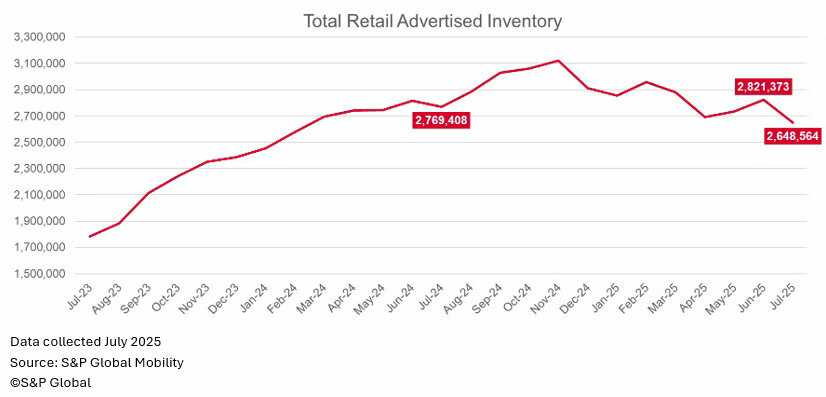Overall Situation in the US Car Market
New data indicates a decrease in the availability of new cars in the United States, as well as a shift in consumer preferences. In July, total vehicle inventories across the country decreased by 6.1% compared to the previous month, reaching approximately 2.65 million units. This points to a further tightening of the market, which has been ongoing since November 2024.
The average supply period for new cars has shortened to 70 days, which is significantly less compared to 97 days at the beginning of this year. These updated figures are based on dealer-advertised inventories, not manufacturer reports, providing a more accurate and up-to-date picture of the real situation.
Changes in Inventories of Different Brands
Several brands showed a significant reduction in inventories compared to June. Nissan reduced inventories by 15%, Mercedes-Benz by 14%, Chevrolet by 9.6%, and Honda by 9.3%. In contrast, Volkswagen inventories increased by 9.5%, and BMW showed an increase of 5.4%.
Price Pressure
Along with the reduction in supply, prices are also showing some changes. The average Manufacturer’s Suggested Retail Price (MSRP) in July decreased to $50,772, which is $385 less than in June. Discounts also decreased – from $3,405 to $3,226. While these changes are not radical, they reflect a market where limited supply is gradually reducing incentives.
Electric vehicles are also feeling this pressure. As of July, according to S&P Global, there were approximately 188,000 electric vehicles in stock, which is 4.9% less compared to last year and 11.6% less than the previous month. This drop is largely linked to the upcoming expiration of federal tax credits for electric vehicles.

Among key electric vehicles that saw inventory reductions were the Hyundai Ioniq 5 (-1.9%), Chevrolet Equinox (-16%), and Honda Prologue (-25%). For comparison, Ford Mustang Mach-E inventories increased by 10.4% since June.
Inventory reduction is also observed among hybrid cars: from 67 days in June to just 58 days in July. In some regions, the supply is even more limited: 47 days in Dallas, 46 days in Houston.
Pickups and the Impact of Tariffs
A significant inventory reduction was also recorded in the full-size pickup segment, where they fell by 13.4% compared to last year and by 9.7% compared to the previous month. Toyota Tundra inventories are particularly tight, having decreased by 37% since June, or by approximately 11,000 units.
Tariff policy remains another important factor. In July, about 884,000 vehicles still had the “pre-tariff” designation, which is less compared to 948,000 in the previous month. The continued reduction highlights how trade measures continue to affect supply chains.


These trends could have long-term consequences for automakers and consumers, especially in the context of the transition to cleaner technologies. The growing popularity of hybrids and electric vehicles, along with regulatory changes, may continue to shape the market in the coming months, affecting prices, availability, and overall demand dynamics.


 by
by 
